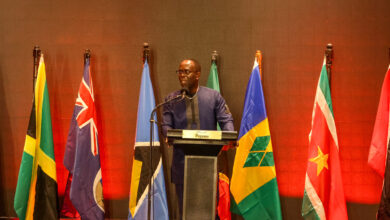(CARICOM Secretariat, Turkeyen Greater Georgetown, Guyana) The Council for Trade and Economic Development (COTED) of the Caribbean Community (CARICOM) on Friday concluded its Thirty-Sixth Meeting recording progress to boost the Community’s trade and development agenda in key areas.
Over two days, 2-3 May, 2013, the Ministers, meeting at the Pegasus Hotel in Georgetown, Guyana, advanced discussions on the strategic direction of the Council itself; pursued a solution with respect to the threat to the Region’s rum industry; and received direction on the negotiations for the CARICOM-Canada Trade and Development Agreement. There was agreement also on the way forward with respect to the consolidation of the CARICOM Single Market and Economy (CSME).
The stage for the meeting was set on Thursday morning with pointed statements by the three speakers at the opening ceremony – CARICOM Secretary-General Ambassador Irwin LaRocque, Foreign Affairs Minister of Guyana, the Hon Carolyn Rodrigues-Birkett and Chair of the Meeting, the Hon Oliver Joseph, Minister of Economic Development, Planning, Trade and Cooperatives – who called for greater focus and efficiency with respect to pushing the Region’s agenda.
Particularly as a result of the changing global economic environment, the COTED has recognized that a revaluation of its responsibility as the Council responsible for matters relating to the economic development of the Community was necessary. Ministers had a frank exchange of the role of the COTED and what needed to be done to make it more relevant. Given the importance of this issue, they agreed that they will meet in a dedicated and focused session in September. Key among the issues for consideration will be the prioritisation of the work of the COTED, the implementation of outstanding mandates, especially as regards the CSME, and the role of the Private Sector in the economic development of the Community. It is also expected that following this Special Session, a strategy for engaging the private sector will emerge.
The consolidation of the CSME was uppermost in the minds of Ministers at this meeting. The discussions were conducted against the background of the acknowledgement that the CSME was the Community’s best prescription for long-term sustained economic growth, development, and enhanced integration.
Ministers considered the status of free movement and facilitation of travel within the Community and the different options to address the concerns of citizens as well as the timelines for implementation of outstanding matters. The need for data and information sharing on free movement and migration statistics was paramount to the success of the free movement regime, and in that regard, a pilot project to strengthen the capacity of CARICOM Member States to generate such data is being undertaken.
The absence of adequate data to allow effective decision-making is one of the major challenges of policy-makers. The Ministers were therefore happy to learn of the modernization of the Regional Statistics Work Programme which was designed to address the statistical requirements of Member States.
In the area or harmonization of policies and procedures, Ministers agreed to the elements to be included in frameworks on consumer protection, Small and Medium Enterprises and the provision of professional services in the CSME. When finalized, these frameworks will allow the private sector and consumers to further participate in the CSME.
There was also substantial progress on the development of an exemptions regime for CARICOM Cultural industries. Once this mechanism is finalised, artistes operating in the CSME will be in a position to enjoy duty exemptions on their tools of trade.
With regard to food production, the COTED took the concrete decision to reclassify the tariff heading for marinated chicken. Previously, marinated chicken was allowed access into the market at a lower rate. This decision by the COTED has been applauded by the Caribbean Poultry Association (CPA).
In the area of food safety, Ministers underscored the importance of the Caribbean Agricultural Health and Food Safety Agency (CAHFSA) in ensuring trade in agriculture products are done in a safe and healthy manner which would minimize risk to the consumer. They also agreed to a regional standard for rice.
Ministers also agreed to prioritise the matter of intra-regional transportation for agricultural products within the wider context of improving the transportation infrastructure in the Community. This issue among other key transportation matters will be on the agenda of the upcoming special COTED Meeting on transportation later this month.
In the realm of external trade, Ministers had an extensive engagement on the threat to CARICOM exports of rum to the United States. CARICOM is determined to seek a satisfactory solution to the matter of trade-distorting subsidies being granted to USVI and Puerto Rico rum producers that threaten the long-term viability of the rum industry in the Caribbean. Ministers agreed to explore all avenues to address this serious matter with the United States and other relevant parties.
As negotiations continue between CARICOM and Canada, the Ministers reiterated their commitment and determination to conclude a comprehensive Trade and Development Agreement with Canada while at the same time recognising the importance of the CARIBCAN arrangement to Member States.
Ministers also considered the vacant post of Director-General of the World Trade Organisation (WTO) and the need for the selection of a candidate the support the position of CARICOM as small vulnerable economies requiring special attention.





